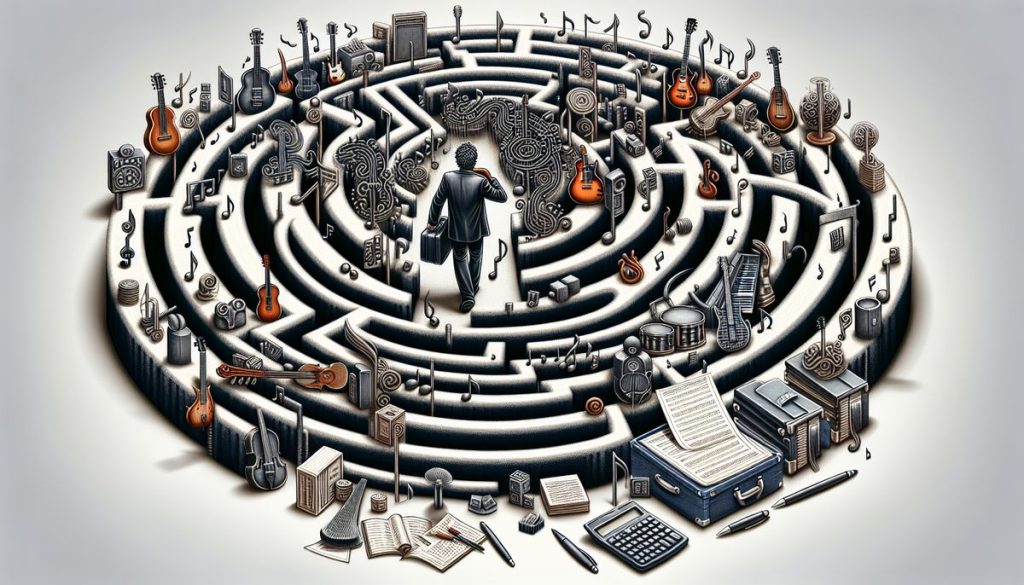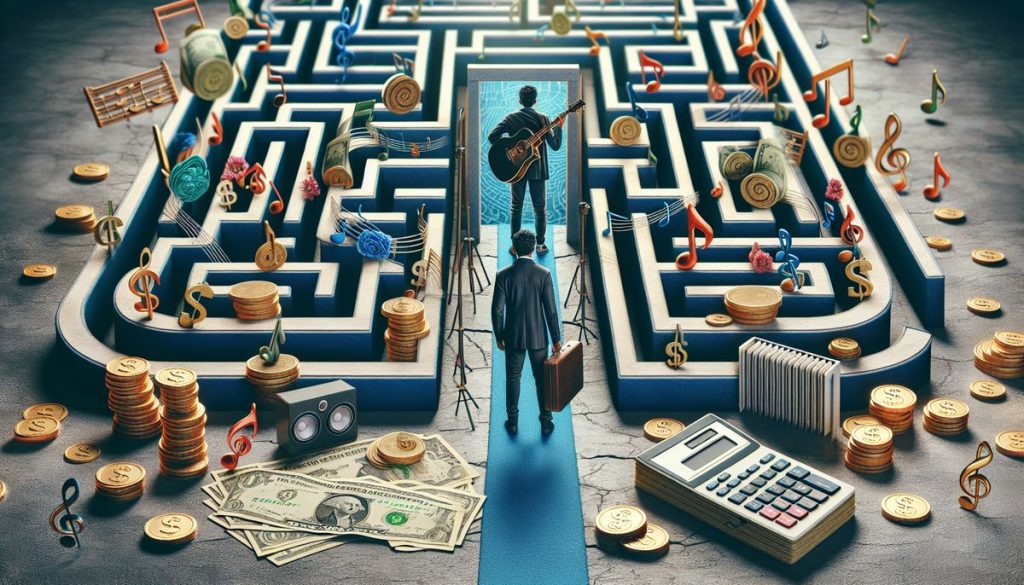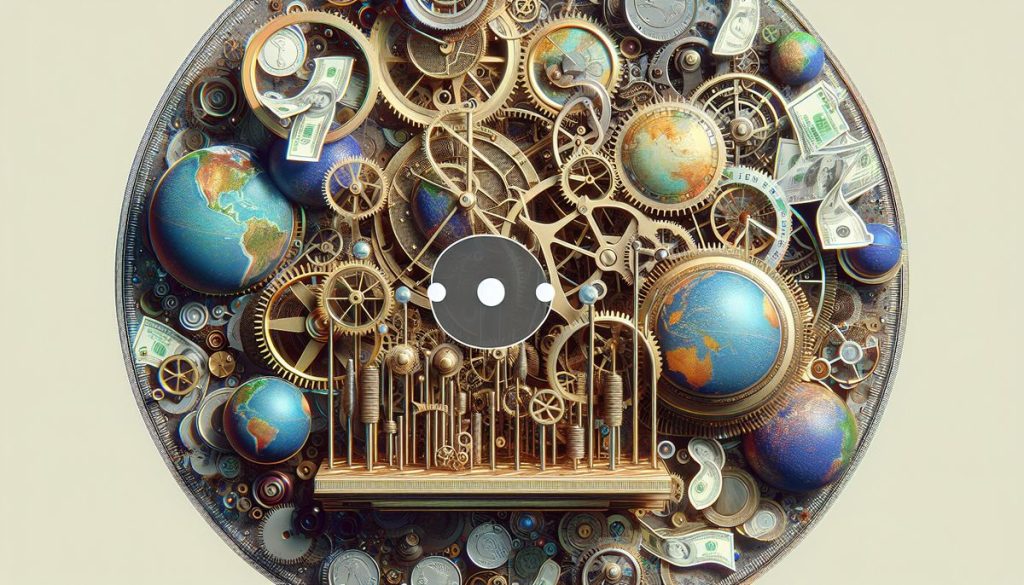The Beat of Budgeting: Mastering Financial Literacy as a Rising Music Artist
Written by DJ Prodigee on Tue Apr, 2024
As a rising music artist in today’s industry, mastering the rhythm of financial literacy is as crucial as hitting the right notes in your music. With the dynamic and often unpredictable nature of the music business, it’s essential to be well-versed in managing your finances to ensure long-term sustainability and success. In this article, ‘The Beat of Budgeting,’ we’ll explore the key strategies and insights that will help you harmonize your income with your expenses, avoid debt, and build a strong financial future.
Key Takeaways
- Understanding the basics of budgeting is essential for financial harmony as a music artist, helping to balance income and expenses.
- Avoiding debt and managing spending are critical for maintaining financial stability in the fluctuating music industry.
- Leveraging music royalties, licensing deals, and merchandise can diversify income and enhance financial security.
- Engaging with the creator economy and networking can unlock new revenue streams and opportunities for financial growth.
- Regularly tuning your financial plan to the evolving landscape of the music industry is key to achieving long-term financial success.
Tuning Your Finances: A Jam Session with Your Budget
Finding Your Financial Rhythm: The Basics of Budgeting
Let’s face it, budgeting can be as fun as a metronome at a guitar solo. But just like that steady tick-tock keeps a band in sync, a solid budget keeps your finances from going offbeat. Finding your financial rhythm isn’t about cutting out the fun, it’s about making sure you can afford your drumsticks and your rent.
- Set Goals: Dream big, but plan realistically. Whether it’s a new amp or a tour van, know what you’re saving for.
- Track Money In, Money Out: Like a sound engineer tweaking the levels, adjust your income and expenses until the mix is just right.
- Stick to Your Budget: It’s like learning a new riff – practice makes perfect, and the same goes for spending wisely.
Remember, a budget is a living document, as dynamic as your setlist. Review and adjust it regularly to keep your financial performance chart-topping.
Harmonizing Income and Expenses: Striking the Right Chord
Let’s face it, balancing your cash flow is like trying to nail that perfect harmony in a duet – it takes practice, patience, and a little bit of magic. Getting your finances in sync isn’t just about hitting the high notes with your income; it’s about ensuring your outgoings aren’t stealing the show.
Imagine your budget as your setlist – you’ve got your headliners (rent, food, studio time) and your opening acts (that fancy guitar pick, the occasional splurge on vinyl). Here’s a simple breakdown to keep your financial concert on track:
- Income: Your ticket sales, streaming royalties, and that sweet gig at the coffee shop.
- Fixed Expenses: The rent’s due, and so is your student loan – no encore here.
- Variable Expenses: Groceries can swing, and so can your electric bill, depending on how many times you rehearse that killer solo at 2 AM.
Remember, a budget that’s more flexible than a guitar string in a solo can handle life’s unexpected stage dives.
And if you’re thinking about going on a spending spree after a successful show, pump the brakes, my friend. That’s how you end up singing the blues with an empty wallet. Instead, treat your budget like a jam session – improvise wisely, but always keep the rhythm going.
Avoiding the Debt Trap Solo: Smart Spending for Artists
Let’s face it, the life of a rising music artist isn’t just about dropping sick beats and shredding on stage. It’s also about not shredding your wallet with debt. Just like in music, balance is key in budgeting. The money you earn from gigs, record sales, streaming revenue, and music lessons should cover your combined expenses, or you’ll be facing the music in a way you won’t enjoy.
Here’s a quick hit list to keep your finances in tune:
- Stick to Your Budget: Easy tips to stay on track. Say goodbye to impulsive spending and hello to good habits.
- Adjust Your Budget: Life changes, so should your budget. Tips on handling surprises and reaching big goals.
- Grow Your Money: From paying debts to saving, learn simple ways to make your money work for you.
Remember, a budget is like a setlist for your cash. Plan it well, and you’ll have a performance that leaves both you and your bank account feeling like rockstars.
Most artists, including producers, must support themselves with a "day job" when starting out. The important thing is that a day job should pay living costs and be flexible enough, while not being so demanding or tiring that it leaves no time and energy for producing music.
The Ballad of the Broke Musician: Busting Myths with Dave Won
Childhood Choruses: How Early Money Lessons Shape Us
Remember when your biggest financial decision was choosing between a pack of gum or saving those coins for the arcade? Those penny-pinching days weren’t just cute; they were our first gigs in money management. Fast forward to today, and the stakes are higher for us rising music artists. We’re not just talking about chump change for video games; we’re orchestrating our financial futures.
Financial management for artists isn’t just about hitting the right notes on stage; it’s about making savvy money moves offstage too. Crowdfunding, merch sales, live performances, busking, pre-orders, YouTube channels, SB loans – the options are like instruments in an orchestra. Choose wisely to avoid singing the blues. Invest in quality sound for success.
It’s all about the base (no treble) of your budget. Building a solid foundation with the financial chords you learned as a kid can help you amplify your savings and not just your sound.
Here’s a quick rundown of the financial tools at your disposal:
- Crowdfunding: Get your fans to pitch in for your next big project.
- Merch Sales: Your face on a t-shirt can mean dollars in your pocket.
- Live Performances: Where the magic happens and the cash flows.
- Busking: Street cred and coin collection in one.
- Pre-orders: Fans pay upfront, you deliver the hits later.
- YouTube Channel: Turn those views into revenue.
- SB Loans: A risky riff that could help you finance your dreams.
Composing a Debt-Free Life: Strategies from the Budget Maestro
Let’s face it, the myth of the rich rockstar is as outdated as an 8-track player. Dave Won, the Budget Maestro, is here to conduct a symphony of savings and show you that the real key to financial success isn’t just about landing gigs and selling merch—it’s about separating your finances, avoiding the pitfalls of debt, and planning for the future.
Here’s a quick rundown of Dave’s top tips for broke musicians:
- Create a bare minimum budget: Know your essential expenses and stick to it like it’s the chorus of your hit song.
- Gamify debt repayment: Turn paying off debt into a fun challenge. Who says you can’t have a little fun while getting your finances in tune?
- Three pillars of financial wellness: Focus on saving, budgeting, and growing your money. It’s like the holy trinity of money management.
Remember, a debt-free life is like a well-composed melody—it takes practice, patience, and a bit of creativity. So, grab your financial instrument and let’s make some beautiful budgeting music together!
The Crescendo of Savings: Building Your Financial Forte
Let’s face it, saving money can be as tricky as hitting that high note in your latest banger. But, just like mastering a riff, it’s all about practice and a bit of creativity. Start by tuning your savings strategy to the rhythm of your income and expenses. Think of it as your financial setlist, where every dollar saved is a fan cheering you on.
- Stick to Your Budget: Keep your spending in harmony with your goals.
- Adjust Your Budget: When life throws a curveball, your budget should be ready to catch it.
- Grow Your Money: Make your savings sing by investing in your future.
Remember, a crescendo in music gradually gets louder, and so should your savings. Start soft and build up to a financial forte that can’t be ignored.
And hey, don’t forget to diversify your revenue streams. Merch, gigs, streaming, licensing, and maybe even teaching a few chords can add some extra notes to your income scale. After all, treating music as a business is the real key to a chart-topping financial hit.
Royalties and Rights: The Encore Your Wallet Deserves
Understanding the Chart-Toppers of Music Royalties
Let’s face it, when it comes to music royalties, you’re either on top of the charts or you’re singing the blues. Royalties are the bread and butter for any artist, and getting a slice of that royalty pie is like hitting a high note in your bank account. But before you start dreaming of swimming in a pool of coins like some kind of rockstar Scrooge McDuck, you need to understand the royalties game.
Here’s a quick breakdown of the royalty types that could be making you money while you sleep (or while you’re awake, obsessively checking your streaming stats):
- Performance Royalties: When your jam plays on the radio, at a club, or even in an elevator, cha-ching!
- Mechanical Royalties: Every time your track is downloaded or a physical copy is sold, you get paid.
- Synchronization Royalties: If your tune is used in a film, TV show, or commercial, you’re in the money.
- Print Royalties: Yes, even sheet music sales can add up!
Master budgeting, funding options, contracts, royalties, and taxes for musicians. Partner with a financial advisor for stability. Understand cash flow and expenses for financial success.
Remember, it’s not just about making music; it’s about making money from your music. So, get in tune with your royalties and start conducting your cash flow like a maestro!
Getting in Tune with Licensing Deals
Let’s face it, the only thing more confusing than a capo on the 7th fret is the world of licensing deals. But fear not, my fellow strummers and drummers, because getting your tracks on a sync license is like hitting the high note in your career solo. It’s all about giving your tunes a ticket to ride the airwaves of movies, commercials, and video games.
Sync licensing is the backstage pass to royalties that keep paying you long after the gig is over. Here’s the deal: you’ve got rights, and those rights have dollar signs attached. But who’s keeping score? Well, that’s where the key players come in – the composers, the publishers, and the producers who’ve got an ear for a hit and an eye on the prize.
- Composers: They create the magic.
- Publishers: They make sure the magic pays.
- Producers: They turn the magic into moolah.
Remember, your music is your business. Treat it with the same care you’d give your beloved vintage guitar or that rare vinyl collection.
And while we’re jamming out to the thought of our music making bank, let’s not forget those financial literacy tips for aspiring musicians: budgeting, diversifying revenue, understanding royalties, investing wisely, seeking professional advice. Manage finances like a business to succeed in the music industry.
Merch and Mixtapes: Diversifying Your Revenue Setlist
Let’s face it, your fans want more than just ear candy; they want to wear your sound and plaster their walls with your face. Merch is the silent hit single of the music biz. But wait, there’s more! Mixtapes? They’re like the secret sauce, adding that extra zing to your revenue burger.
Remember, it’s not just about slapping your logo on a tee. It’s about creating an experience that fans can’t resist.
Here’s the lowdown on making your merch stand out:
- Limited edition goodies: Think tees that scream ‘I’m with the band’ and posters that double as modern art.
- QR-coded swag: It’s like a treasure hunt, but instead of a map, fans get cool merch that unlocks your world.
- VIP merch: This isn’t just a backstage pass; it’s a golden ticket to the Wonka factory of your music.
And for those mixtape mavens:
- Limited drops: Release them like they’re hotcakes, and watch as fans scramble to get a taste.
- Social media Q&As: Get personal while you push those playlists.
- Collab with fans: They’re your street team, your hype squad, your mixtape messiahs.
The Creator Economy: Remixing Financial Education with Gabriel Nussbaum
The Beat Drops on £21.6 Billion: A New Financial Education Track
When Gabriel Nussbaum, the maestro of money, hits the play button on financial education, you know it’s not just another remix. We’re talking a whole new groove in the creator economy worth a whopping
£21.6 billion! This beat is so fresh, it’s minting new financial gurus overnight.
So, what’s the secret sauce? It’s all about embracing the digital age with online workshops, masterclasses, and music lessons. But wait, there’s more! You’ve got to maximize earnings through merchandise sales, licensing deals, and royalties. And let’s not forget the golden rule: budget wisely for financial stability as a musician.
Here’s a quick breakdown of the top tracks in Gabriel’s financial hit list:
- Social media as the new classroom
- Spotting the real deal in a sea of fake news
- Busting myths and tuning up your money mindset
Remember, folks, it’s not just about making it rain; it’s about making sure your financial garden grows. Plant those seeds with knowledge, and watch your bank account bloom!
Collaborating with Coins: Networking and Money in the Creator Space
Let’s face it, in the creator economy, it’s not just about who you know, but also about who knows your bank account. Networking is like the secret sauce to a juicy career burger, and when done right, it can lead to some tasty financial gains. Networking is the art of turning chit-chat into cha-ching.
When you’re rubbing elbows with fellow creators, remember that collaboration is the name of the game. It’s like a potluck dinner; everyone brings something to the table. And if you play your cards right, you might just end up with a feast. Here’s a little KonnectPop wisdom: "Just do it. Make sure to do research, read up on what you want to put together, and take it step by step." Wise words indeed!
Remember, the goal is to create a symphony of connections that resonate with your brand and wallet.
Now, let’s talk turkey—or should I say, ticket sales? Organizing events can be a cash cow if you know how to milk it. But watch out for the cost and location; they can be real party poopers. KonnectPop spills the tea: "The cost and the location can be the most difficult aspects to setting up an event." So, keep your eyes peeled and your budget flexible.
Side Hustles and Sync Deals: The B-Sides of Income Streams
Let’s face it, the life of a music artist isn’t always packed with glitz and glamour—sometimes it’s about getting down to the nitty-gritty of making ends meet. Side hustles are the unsung heroes of the artist’s income, the B-sides that never make it to the radio but keep the lights on and the guitar strings fresh.
For instance, take Jack, who turned a modest
investment into a six-figure revenue stream on Amazon. Finding the right mentor, like Jack did, can be the difference between a side hustle that’s a one-hit-wonder and one that’s a chart-topper.
But wait, there’s more! To earn royalties, you need to get your tunes on streaming platforms. Sure, they might not pay enough to buy a gold-plated saxophone, but every little bit helps. Here’s a quick hit list of platforms to consider:
- Apple Music
- Spotify
- Tidal
- Amazon Music
Remember, diversifying your income is like adding more instruments to your band. It might be a bit chaotic at first, but it’s the only way to make sure your financial melody is rich and full.
Money Gains Podcast: Turn Up the Volume on Your Finances
Saving with Swagger: Tips to Keep Your Wallet Fat
Let’s face it, keeping your wallet plump isn’t just about cutting coupons and living off ramen (though, let’s be real, ramen can be a lifesaver). It’s about making smart choices that keep your cash flow grooving to the beat of your life’s soundtrack. First up, set up a dedicated bank account for your musical endeavors. This isn’t just about looking professional; it’s about separating your stage money from your snack money.
- Stick to your budget like it’s the chorus of your hit song. You wouldn’t change the lyrics on stage, so don’t change your spending in real life.
- Adjust your budget when life throws you a curveball. Got a gig that pays more than usual? Awesome! Save that extra dough for a new guitar or, you know, rent.
- Grow your money by paying off debts and saving. Think of debt as that one bad note that throws off the whole song—get rid of it!
Remember, budgeting isn’t about restricting your lifestyle; it’s about amplifying your financial freedom. So, track your expenses, budget for the future, and seek professional advice when you hit a sour note. And hey, avoid those common pitfalls like they’re an out-of-tune guitar at a live show.
Investing in Your Setlist: Long-Term Financial Grooves
Let’s face it, your setlist isn’t just a bunch of songs; it’s your retirement plan in disguise. Investing in your music is like planting a money tree
- but instead of leaves, it sprouts royalties. To make sure your tree grows tall and your pockets deep, you’ve gotta water it with some financial literacy.
Here’s a quick riff on making your money work for you:
- Diversify your investments like you would your setlist. Don’t put all your eggs in one basket—or all your tracks on one album.
- Reinvest your gig earnings into better equipment or marketing. Think of it as buying your future self a better tour bus.
- Educate yourself on the legal mumbo-jumbo. It’s about as fun as a broken string during a solo, but it’s essential.
Remember, the goal isn’t to make a quick buck; it’s to build a stage that lasts a lifetime.
And hey, if you’re feeling lost in the financial fog, the Money Gains Podcast is like a lighthouse for your bank account. They’ve got episodes on everything from income funds to the art of balanced portfolios. Tune in, turn up the volume, and get your finances rocking to the rhythm of success.
Budget Remixes: Adapting Your Financial Plan to Life’s Beat
Let’s face it, your budget isn’t a set-it-and-forget-it playlist. It’s more like a live jam session, constantly evolving with the rhythm of your life. Adapting your financial plan is crucial because, just like in music, you can’t play the same tune forever and expect the crowd to stick around.
- Stick to Your Budget: Keep those spending impulses in check.
- Adjust Your Budget: When life throws a curveball, pitch back with a budget that bends.
- Grow Your Money: Make your cash dance to the beat of compound interest.
Embrace the improvisation of personal finance. When your income hits a high note or your expenses drop the bass, remix your budget to keep the party going.
Remember, a budget that can’t flex with your life’s tempo is like a one-hit wonder. To truly budget like a boss, you need to be ready to switch up your financial setlist. Whether you’re dealing with a surprise gig payout or an unexpected broken string, your budget should be your backbeat, keeping you steady. So, let’s get fiscal! (See what I did there?)
Conclusion: Rock Your Finances Like a Platinum Hit
Alright, you musical money maestros, we’ve jammed through the symphony of savings and danced down the budgetary yellow brick road. If you’ve been tuning in, you’re now ready to drop the mic on bad spending habits and riff on some righteous financial literacy. Remember, sticking to your budget is like keeping the beat in a killer chorus—it’s essential. And when life throws you a curveball, just improvise like a jazz legend and adjust that budget. Let’s not forget, growing your money is the ultimate encore, so invest in those savings like you’re headlining at Coachella. Keep strumming those savvy strategies, and soon you’ll be harmonizing with the high rollers. Rock on, fiscal virtuosos, rock on!
Frequently Asked Questions
As a rising music artist, what are the key financial literacy concepts I should focus on?
It’s essential to understand budgeting, managing expenses, saving for the future, and understanding your income streams, including music royalties and licensing deals. Learning how to avoid debt and make smart spending choices specific to the music industry is also crucial.
How can I create a budget that accommodates the unpredictable income of a music artist?
Start by identifying your regular expenses and creating a bare minimum budget. Allocate funds for your essential needs first, then adjust your budget as your income fluctuates, setting aside savings during more profitable periods to cover leaner times.
What strategies can help me avoid falling into debt as I pursue my music career?
Focus on smart spending, prioritize needs over wants, and avoid impulsive purchases. Consider gamifying debt repayment to make it more engaging. Stick to your budget and adjust it as needed to prevent overspending.
How do early money lessons impact my financial literacy as a music artist?
Childhood financial lessons often shape your attitudes and behaviors towards money. Understanding these influences can help you develop a healthier relationship with money, supporting your financial peace and intentionality in your music career.
What are some effective ways to diversify my income as a music artist?
Explore various revenue streams such as live performances, merchandising, music royalties, licensing deals, and online content creation. Consider side hustles and sync deals to supplement your income and reduce financial risks.
How can I educate myself about music royalties and licensing to maximize my earnings?
Stay informed about the different types of music royalties and how they work. Network with industry professionals, attend workshops, and consult with a music rights organization to understand how to negotiate licensing deals and collect the royalties you’re owed.







